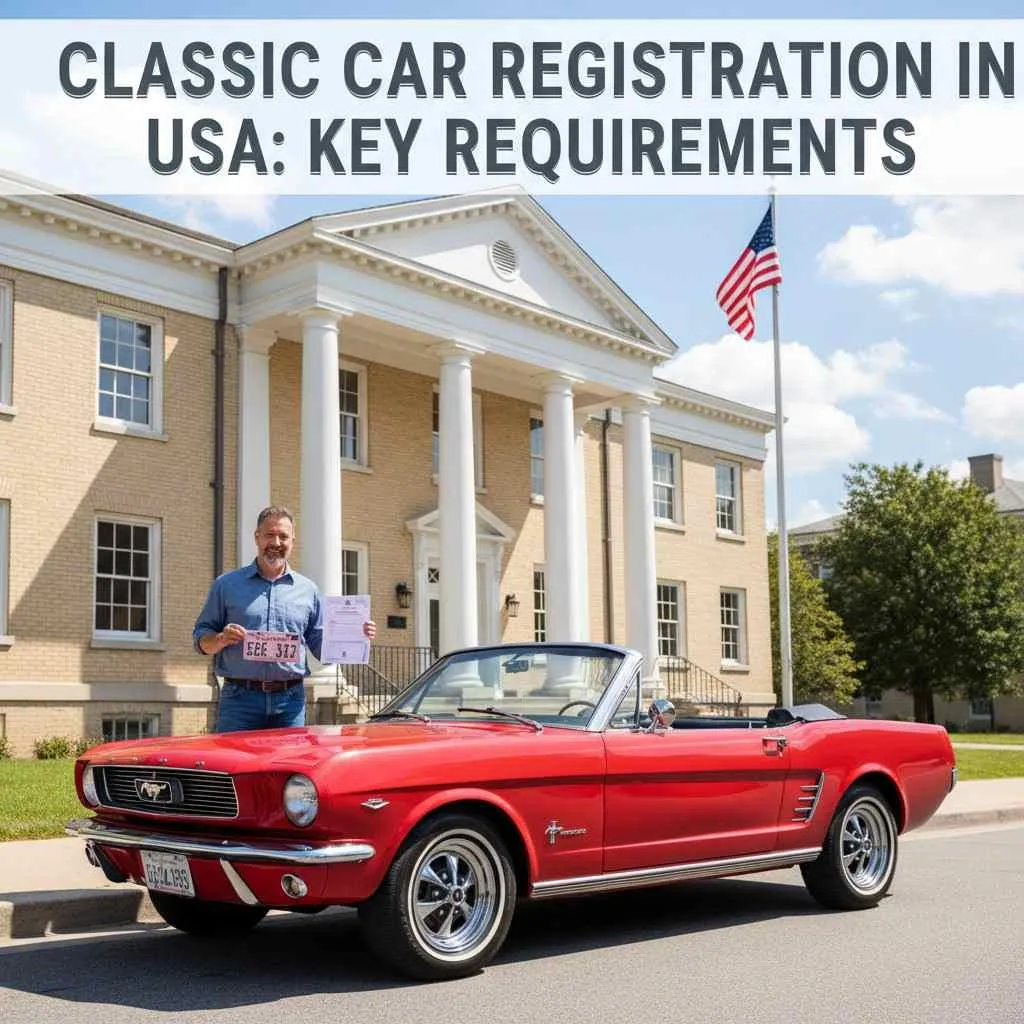
Classic Car Registration in the USA: Key Requirements
Owning a classic car, such as a 1965 Ford Mustang or a 1978 Chevrolet Camaro, is a passion that celebrates automotive history. Registering your vehicle as a classic, antique, or historic car in the United States offers distinct advantages, including lower fees, special license plates, and exemptions from certain regulations.
However, the process varies by state, requiring careful attention to eligibility, documentation, and restrictions. This guide provides a detailed overview of what you need to register your classic car, ensuring it’s legally recognized for shows, parades, or limited road use.
Key Takeaways
How states define classic, antique, and historic vehicles
Key documents and state-specific procedures
Financial and non-financial benefits of registration
Steps to navigate challenges like imports or restored cars
By the end, you’ll have a clear path to register your classic car, avoid common issues, and enjoy its historical value legally.
What Defines a Classic Car in the USA?
The definition of a classic, antique, or historic vehicle varies by state, based on age, collectible value, and usage. These criteria determine eligibility for special registration status, which comes with unique benefits and limitations. Federal regulations also play a role for imported vehicles, offering exemptions for older models.
Age and Model Requirements
States typically set an age threshold of 20 to 25 years for classic status, with some requiring 30 years for antique or vintage designations. For example, Texas considers vehicles 25 years or older eligible for antique car registration age limit, while Utah sets a 30-year minimum for vintage status. California often uses pre-1976 as a benchmark for exemptions. Eligible models include iconic cars like a 1978 Chevrolet Camaro, a 1970 Dodge Charger, or a 1960s Jaguar E-Type. The Classic Car Club of America (CCCA) defines classics as vehicles from 1915 to 1948, though state DMVs may use broader criteria.
Condition and Usage Factors
Classic cars must be preserved or restored, serving as collectors’ items for shows, parades, or club events, not daily commuting. States like New York require the vehicle to retain its historical character, and excessive modifications, such as non-period-correct engines or body changes, may disqualify it from historic vehicle plates eligibility.
Federal rules, overseen by the National Highway Traffic Safety Administration (NHTSA) and US Department of Transportation (DOT), exempt imported vehicles over 25 years from certain safety standards, simplifying registration for foreign classics.
Why Choose Classic Registration? Unlocking Hidden Benefits
Registering a classic car offers financial and practical advantages, making it appealing for collectors and enthusiasts. These benefits stem from state policies that recognize the unique role of historic vehicles.
Financial Advantages
Classic car registration often reduces costs compared to standard registration. For example, Texas charges a $50 fee for antique plates, valid for five years, with no annual renewals in some cases. Virginia offers a one-time $50 fee for antiques. States like California provide classic car emissions exemption for pre-1976 vehicles, avoiding smog test costs.
Using a Montana LLC, as facilitated by services like Street Legal Hookup, can bypass sales tax for vehicles 11 years or older, saving thousands. Classic car insurance, with agreed value coverage, also offers lower premiums than standard policies.
Non-Financial Perks
Special historic or antique plates enhance a vehicle’s authenticity, signaling its collector status and allowing participation in events like parades or car shows. Registration documents the car’s historical significance, boosting resale value, especially for CCCA-recognized models. These perks foster community engagement among enthusiasts.
Is Your Vehicle Eligible? Key Qualification Checks
Confirming eligibility is critical before registering a classic car. States assess age, ownership, condition, and usage, with variations that require careful review.
To qualify, verify:
Age: The vehicle meets the state’s threshold (e.g., 25 years in Texas, 30 years in Utah).
Ownership: You hold a clear vehicle title or proof of ownership.
Condition: The car is restored or maintained as a collector’s item.
Usage: It’s intended for shows or limited use, not daily driving.
Common disqualifiers include excessive modifications or plans for regular use. Kit cars may need a vehicle identification number (VIN) inspection to confirm roadworthiness. Check your state Department of Motor Vehicles (DMV) resources for specific criteria.
State-Specific Eligibility Variations
Rules differ across states. Virginia requires a one-time $50 fee for antiques 25 years or older, with no emissions or safety inspections. Pennsylvania mandates a title and sales tax forms. New York imposes stricter antique vehicle safety inspection requirements. High-regulation states may have additional hurdles, so consult your state DMV office for clarity.
What Documents Do You Really Need for Registration?

Registering a classic car requires specific paperwork to prove ownership, compliance, and eligibility. While requirements vary, certain documents are standard across states.
Core Paperwork Breakdown
Vehicle Title: A clean title serves as proof of ownership, required nationwide. Missing titles may require replacement or bonded title processes.
Bill of Sale: Documents the purchase and transfer history, supporting the title.
Proof of Insurance: Classic car insurance requirements include a policy tailored for limited use, reflecting the vehicle’s collectible status.
Odometer Statement: Some states, like Florida, require this for vehicles under certain age limits.
Registration Form: State-specific forms, like Texas VTR-54 for antiques or California’s Limited Use Declaration, are mandatory.
Optional or Special Docs
Restored or imported vehicles may need additional documents. For restored cars, builder’s affidavits or parts receipts verify authenticity. Imported vehicles over 25 years require federal forms like EPA 3520-1 and DOT HS-7 to confirm exemptions from emissions and safety standards. Check state DMV requirements for unique cases.
Step-by-Step: How to Navigate the Registration Process

The registration process involves a clear sequence, tailored to state rules. Following these steps ensures a smooth experience.
Research State DMV Rules: Confirm eligibility and requirements via your state DMV website. Texas, for example, distinguishes between antique (shows only) and classic (broader use) plates.
Gather Documents: Collect the title, bill of sale, insurance, and state forms. Verify exemptions, like California’s pre-1976 smog waiver.
Submit Application: File online (e.g., via California DMV or Florida DMV portals) or in person. Pay fees, ranging from $28 in New York to $50–150 in California.
Complete Inspections: Some states, like New York, require a safety inspection; others, like Texas, waive it for antiques.
Receive Plates: Upon approval, receive historic or antique plates or standard plates, based on state rules.
Plan Renewal: Renewal varies from annual (California) to permanent (Virginia).
Street Legal Hookup, a nationwide service, simplifies this process with an online platform, handling paperwork and delivering plates quickly, often within three days, making historic vehicle registration process efficient.
Pre-Application Preparation
Gather all documents and confirm exemptions upfront. Texas DMV provides checklists for antique and classic registrations. If the title is missing, additional steps may be needed for replacement or title recovery.
Submission and Follow-Up
Online submission is available in states like California and Florida, while others require in-person visits for inspections. Fees range from $28 to $150, with wait times of 1–6 weeks. Temporary permits may allow immediate use. Track progress through state DMV portals or services like Street Legal Hookup.
State Variations: Does Location Change Everything?
No uniform national standard exists for classic car registration; rules are state-driven, creating diverse requirements, fees, and exemptions. Consulting your local DMV is essential for accurate information.
Examples from Key States
Texas:
Age Threshold: 25+ years
Requirements: Title, insurance, Form VTR-54 (antique) or VTR-850 (classic)
Fees: $50 for antiques (5 years); $50+ annually for classics
Exemptions: Emissions for 25+ years; safety for antiques
Restrictions: Antiques for shows/maintenance; classics unrestricted with inspections
California:
Age Threshold: 25+ years (historic); pre-1976 exempt
Requirements: Title, Limited Use Declaration, smog check (if applicable)
Fees: $50–150 annually + up to 10.25% sales tax
Exemptions: Smog for pre-1976 or historic vehicles
Restrictions: Exhibitions only unless non-operational
New York:
Age Threshold: 25+ years
Requirements: Title, safety inspection
Fees: $28 + 4–8% use tax
Exemptions: Emissions for historic vehicles
Restrictions: Exhibitions/maintenance only
Virginia:
Age Threshold: 25+ years (antique)
Requirements: Title, one-time registration
Fees: $50 one-time
Exemptions: Emissions/safety for antiques
Restrictions: Collector use only
Utah:
Age Threshold: 30+ years (vintage)
Requirements: Title, proof as collector’s item
Fees: Varies
Exemptions: Emissions for vintage vehicles
Restrictions: Club activities, exhibitions
Handling Regional Differences
High-tax states like California or New York may impose use taxes if a vehicle is primarily stored or used in-state, even if registered elsewhere. A Montana LLC registration can bypass sales tax and inspections, potentially saving $5,000 to $15,000. Consult a tax professional to ensure compliance, as states may scrutinize such strategies.
Are There Restrictions That Could Trip You Up?
Classic car registration includes usage limits to preserve the vehicle’s historical purpose. Non-compliance can lead to penalties, so understanding these restrictions is crucial.
Common Limitations
Most states prohibit daily driving for vehicles with historic or antique plates. Texas antique plates restrict use to shows, parades, or maintenance, while New York and Virginia limit historic vehicles to collector activities. Some states, like California, impose classic car mileage limitations, capping annual mileage. Using the car for work commutes or long distances is generally banned.
Enforcement and Compliance
Violating restrictions risks fines or registration revocation. Maintain a log of vehicle use, documenting trips for shows or maintenance, to prove compliance if questioned. Regular registration renewal, where required, ensures ongoing adherence. Check state DMV guidelines for enforcement practices.
Special Cases: What If Your Classic is Imported or Restored?
Imported, restored, or kit cars present unique registration challenges but can be managed with proper documentation and preparation.
Imported Vehicles
Imported vehicles over 25 years old are exempt from NHTSA and DOT safety and emissions standards. File EPA 3520-1 and DOT HS-7 forms at customs to declare these exemptions. States may require a VIN inspection to verify the vehicle’s identity and condition.
Restored and Kit Cars
Restored vehicles need proof of authenticity, such as parts receipts or builder’s affidavits, to confirm compliance with original manufacturer specifications. Kit cars and modified vehicles often require a VIN inspection to verify roadworthiness. States like California may demand additional documentation to meet state regulations.
Why Choose Street Legal Hookup
Registering a classic or antique car can be complicated, with every state having different age limits, forms, and inspection rules. Street Legal Hookup makes the process effortless by handling everything online while helping collectors and enthusiasts secure legal, tax-efficient classic car registration across all 50 states.
Our Expertise:
Flat $995 Pricing: Skip unpredictable state fees and enjoy one transparent, all-inclusive rate for your classic car registration.
Tax Savings with Montana LLC: Legally bypass sales tax and emissions testing through a Montana LLC setup, saving thousands compared to high-tax states.
Permanent Plates for Eligible Classics: Qualify for lifetime plates (no renewals) on eligible classic or antique cars over 11 years old.
Nationwide Classic Registration: We handle state-specific requirements, from Texas to California, ensuring your classic meets all local and federal standards.
Fast, Online Processing: Submit documents, track progress, and get your plates shipped in as little as three days without standing in DMV lines.
Specialized Classic Car Support: Our team has years of experience with vintage, imported, and restored vehicles, ensuring your car qualifies for the correct status and exemptions.
Guaranteed Legal Compliance: Every registration is fully compliant with state and federal laws, backed by our money-back guarantee for total peace of mind.
Frequently Asked Questions
What do I need to do to register a classic car?
Verify eligibility (typically 25+ years old), gather a vehicle title, bill of sale, classic car insurance, and state-specific forms. Submit to your state DMV, pay fees, and complete inspections if required. Check DMV websites for details.
What are the requirements of a classic car?
A classic car must be 25+ years old, maintained as a collector’s item, and used for exhibitions. Requirements include a clear title, insurance, and state forms, with possible inspections or exemptions.
What is legally a classic car?
States define classic cars as vehicles 20 to 30 years old, preserved for historical value. Texas sets a 25-year threshold for antiques, while Utah requires 30 years for vintage status.
What are the benefits of registering a car as a classic?
Classic car registration benefits include lower fees (e.g., $50 for 5 years in Texas), emissions and safety exemptions, historic plates, and cheaper insurance, plus enhanced resale value.
How do I register a classic car?
Research state DMV rules, confirm eligibility, submit a title, insurance, and forms, pay fees, and complete inspections if needed. Plates are issued after approval, with renewals varying by state.
What is the antique car registration age limit?
The antique car registration age limit is typically 25 years (Texas, Virginia) or 30 years (Utah). California uses pre-1976 for exemptions. Check the state DMV for specifics.
What are the classic car insurance requirements?
Classic car insurance requirements include a policy for limited use with agreed value coverage. Providers like Hagerty offer lower premiums for collector vehicles based on restricted driving.
Conclusion
Registering a classic car in the USA requires understanding state-specific criteria, from age and condition to documentation and usage limits. By verifying eligibility, gathering documents like a vehicle title and insurance, and following your state’s DMV process, you can secure historic or antique plates and enjoy benefits like cost savings, exemptions, and event access. Whether handling a restored or imported classic, preparation is key to avoiding delays and ensuring compliance.
For a streamlined experience, Street Legal Hookup simplifies classic car registration across the USA. Their online platform handles paperwork, offers tax-saving options like Montana LLCs, and delivers plates in as little as three days. Visit their website to learn how they can save you time and costs.
Want to learn everything you need to know about making your classic car officially road-legal? Check out Classic Car Registration: A Complete Guide for all the essential steps.



